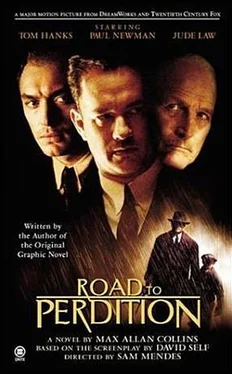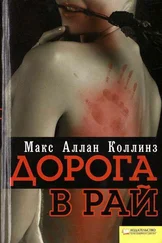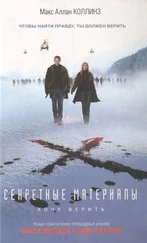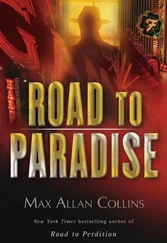Rance was, after all, the financial advisor to, and one of the top accountants of, the Capone organization, second only to Jake “Greasy Thumb” Guzik himself. And Guzik represented the old breed — Rance was the future.
Though he’d been sitting there throughout the meeting, Rance exchanged nods and polite introductions with everyone at the table, thanking Kelly for his “graciousness,” but otherwise allowing the lawyer to carry the ball.
Adjusting his wirerims, his eyes on Looney, Kelly said to the assemblage, “Mr. Rance and I met with John earlier today, to make another bid for our involvement with this up-and-coming surge of unionism. Speaking on the authority of his position with our associates in Chicago, Mr. Rance’s opinion is that Prohibition, unfortunately, won’t last forever.”
Nods and frowns and chuckles greeted this observation, which was hardly stop-the-presses news.
“Mr. Rance feels that we should be looking ahead,” Kelly continued, “for new sources of income.”
O’Sullivan wondered why Mr. Rance wasn’t speaking for himself.
Perhaps the reason was John Looney, whose voice boomed from the head of the table: “And I gave our friend Mr. Rance the same answer I have given him before — no unions for us. Too much trouble, too much grief.”
Connor, who’d been lying back but listening intently, sat forward now, leaning in toward his father. “Pa, much as I respect your view, I thought — since we have everyone here — it might be worth our time discussing the matter. After all—”
“What men do after work,” Looney said, cutting off his son, “has made everyone at this table rich... including Mr. Rance and our friends in Chicago. Men like to drink, men like to place a bet, men like to wench... and they pay us dearly for the privilege. We don’t need to screw them at work, as well... Next subject.”
Connor almost spoke, thought better of it, and glanced down the table toward Rance, whose flicker of displeasure was not lost upon O’Sullivan, who wondered if Looney — the old man sat with arms folded, staring straight ahead — had noticed.
Kelly, who knew not to challenge his longtime law partner, had moved on to a new topic. “John also made it clear, in our meeting, that Fin McGovern’s operation will be divided up locally among two territories.”
A hand down the table from the manager of the Quinlan riverboat casino half-raised, but Kelly beat the man to his question.
“John will study the situation,” Kelly said, “and will select personally how this division will be made, and to whom.” With a less than subtle nod toward the empty chair of Fin McGovern, Kelly added, “Since everyone in Rock Island County and the surrounding area respects John, and his wishes, there will be plenty of help and protection, should there be anyone else with different ideas.”
“And good luck to anyone,” Looney said, “with different ideas.”
Connor laughed at that, but no one else did.
O’Sullivan knew Connor had misread his father — laughter was not the appropriate response, here; no one in the room — except perhaps Connor himself, the man who’d pulled the trigger on Fin McGovern — took what had happened last night lightly.
Kelly was saying, “That wraps up what I have — any other business, anyone... John?”
Looney was staring at the empty chair. Then, without looking at his son, the old man said, “Connor — perhaps you’d like to say something regarding last night’s unfortunate events.”
And now John Looney turned his gaze upon his boy — O’Sullivan could not see the gaze, from where he stood, but in his mind’s eye he saw it vividly: ice-blue eyes, a face as blank as a slate, but ready for rage to be written on it.
Yet the son — who clearly hadn’t planned to speak on this subject, as unprepared as a kid in class with a surprise test sprung on him — said, awkwardly, with a touch of laughter in his tone, “Well, yeah — I guess I should apologize for what happened. Especially to you, Pa — two wakes in a week... what can I say? It’s an embarrassment.”
The two bodyguards at the door — who sometimes rode with Connor — found this funny. Their laughter elicited from the man at the head of the table a slap... against the wood, but it rang in the room as if against their collective cheeks, Connor’s included.
The Grand Parlor went deathly still.
John Looney’s face was long and pale, his eyes glittering with anger. “We lost a good man last night. A misunderstanding among associates led, tragically, to more death... ” His head swiveled toward his son and his stare would have turned Lot’s wife to salt as surely as Sodom and Gomorrah. “... And this you find funny? This you find an embarrassment?”
Connor, already shaken, did his best to maintain a shred of dignity. He said, without laughter, but so quiet it was difficult to hear, “I’d like to apologize for what I did—”
Looney cut his son off at the legs this time. “You’d like to apologize?” He slapped the table again, not as hard, but nonetheless a telling echo. “Try again.”
Silence draped the room, a shroud of humiliation worn by Connor, but uneasily felt by all of them, except old man Looney himself. Much as he despised Connor for what he had done last night, O’Sullivan felt bad for the man, who now pushed his chair away from the table, got to his feet, head hanging, a disobedient child shamed before his peers.
“Gentlemen,” Connor said. “My apologies.”
Face flushed, Connor was looking nowhere; trembling under his father’s censure. Anger would come later — right now it was all the man could do to hold back tears.
Kelly, who O’Sullivan had always found to be a decent man, for an abject crook anyway, said, “Oh, I do have another piece of business,” and he launched into a short tirade about the affiliated businesses, roadhouses and brothels on the outskirts of Looney territory that had not been kicking in their share, of late... at least not on time.
Connor, let off the hook, was back in his chair, glazed, silent.
Looney said, “Our angel can wing his way to these misguided souls, and nudge them into righteousness... Right, Michael?”
“Just tell me who to call on,” O’Sullivan said.
Kelly said, “That character Calvino, over in Bucktown, is way in arrears.”
Looney said to O’Sullivan, “Come up to my study.”
“Sure.”
Then Looney placed both hands flat on the table and pushed himself to his feet, chair scraping back. “Thank you, gentlemen.”
As the men stood, gathering their papers, Looney went to O’Sullivan, slipped an arm around his shoulder, saying, “I know you’re wondering why I’d make an errand boy of you, Michael.”
“No, sir. I wasn’t thinking that.”
Looney, his manner as warm as it was familiar, walked O’Sullivan out of the Grand Parlor, toward the stairs. His voice was affectionate, respectful. “... But when these recalcitrant lads see my angel of death on their doorstep, they’ll know just how serious I am... that the next time they see you, the message you deliver might be from the barrel of a gun... ”
Connor Looney, the only man still seated at the table, watched this bitterly — the men in this room, men who one day would be under his command, had seen his father disrespect him, and treat with favor that gunman, O’Sullivan.
When the room had emptied, Connor moved to the chair at the head of the table, where he could get at his father’s bottle of whiskey. He sat and poured himself a healthy glass, and drank it, sitting alone, deep in thought, lost in the twisted passages of his mind.
Less than an hour later, after meeting with Looney in his study, O’Sullivan strolled to his Ford, parked in the driveway near the Pierce Arrow. He and the old man had gone over the list of bit-borrowers who needed nudging, starting with Tony Calvino.
Читать дальше












